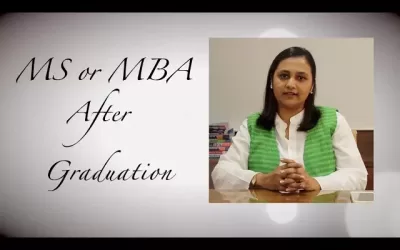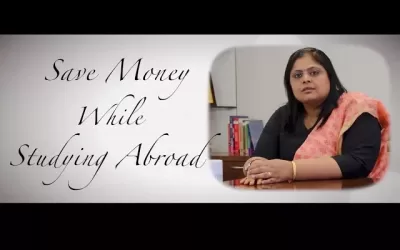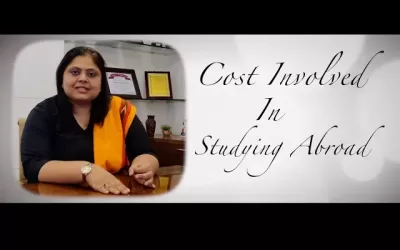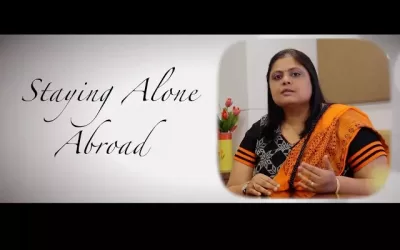 Charting My Academic Expedition: Application for Studying Abroad
Charting My Academic Expedition: Application for Studying Abroad
Application for Studying Abroad – In this episode, Ms. Kunjal Sakhrani talks about important points on how to enhance your applications for studying abroad.
As change is constant we need to work on how to keep our Application discrete and at the same time keep it relevant to the profile.
Following are the pointers on how to enhance your Resume:
- Keep your resume simple and short.
- Highlight your skills, experience, and education.
- Make it brief – Include relevant experience and make it easy for the other person to understand you are fit for the profile.
- Use a professional font – Book Antiqua and Times New Roman are two good font types & font size 12 as selecting a clear and readable font is necessary.
- Include only the most relevant information and put the most important information first.
- Use Active Language – It should be written using active language and not extraneous words.
- For eg: – achieved, earned, and accomplished.
- Update your profile with new training you have finished, accolades you have been awarded, and any new professional membership you now have.
- If you have an actual list of references make sure you list it down at the end of your application. It’s always an advantage to list a few.
- Emphasize what you have been doing to develop your awareness and understanding of your field.
- If you have an actual list of references make sure you list it down at the end of your application. It’s always an advantage to list a few.
- Emphasize what you have been doing to develop your awareness and understanding of your field.
Now let’s talk about the Personal Statement as it is equally important while applying to universities abroad. A personal statement is like a short reflective essay you write about why you’re the perfect candidate for the course you are interested in.
Few tips on how to enhance your personal statement:-
- A coherent and interesting essay adds value to your statement.
- Write about something with substance that adds another dimension to your application.
- The personal statement should sound original, it should sound like you. Be confident in who you are and what you want to achieve.
- Write about what you have been doing to develop your awareness and understanding of the subject you are interested in.
Last but not the least Think of the statement as not only an answer to a specific question but as an opportunity to introduce yourself, especially if your program doesn’t interview applicants. It gives you the chance to show how passionate you are about your chosen subject and why you’re suitable for the course.
It’s also a way for university admissions officers to find out more about you as a person. And on competitive courses, it could very well be the deciding factor in you getting offered a place or not.
Frequently Asked Questions (Faqs) for an Application for Studying Abroad:
1. What is studying abroad, and why is it a valuable opportunity?
Studying abroad involves pursuing educational programs in foreign countries. It offers exposure to different cultures, educational systems, and personal growth opportunities.
2. How can I start the process of applying to study abroad?
Begin by researching universities and programs, determining your eligibility, preparing required documents, and understanding application deadlines.
3. What are the key components of a typical study abroad application?
A typical study abroad application includes an application form, academic transcripts, letters of recommendation, a statement of purpose, and proof of language proficiency (if applicable).
4. How do I choose the right study abroad program or university for my academic goals?
Consider factors such as program relevance to your major, location, duration, cost, and available scholarships when selecting a study abroad program or university.
5. What is a statement of purpose (SOP), and how should I write an effective one?
An SOP is a personal essay that outlines your academic and career goals, reasons for studying abroad, and how the chosen program aligns with your objectives. Be concise and honest in your writing.
6. What are the language proficiency requirements for studying abroad in non-English-speaking countries?
Language requirements vary by country and program. Many institutions require international students to provide TOEFL or IELTS scores to demonstrate English proficiency.
7. How can I secure funding or scholarships for studying abroad?
Research scholarship opportunities, both from universities and external organizations. Financial aid, grants, and scholarships are available for qualified students.
8. What is the visa application process for studying abroad, and how can I navigate it successfully?
The visa application process varies by country. Typically, you’ll need to provide documents like an acceptance letter and proof of financial support. Consult the embassy or consulate of your host country for specific requirements.
9. How can I prepare for the cultural and academic differences I may encounter while studying abroad?
Research the culture, customs, and academic expectations of your host country. Attend pre-departure orientations and connect with current or former students who have studied there.
10. What resources are available to assist with the application process and studying abroad in general?
Utilize resources such as university international offices, study abroad advisors, online forums, and alumni networks to gather information, guidance, and support.
11. What should I do if I encounter challenges or homesickness while studying abroad?
Reach out to the university’s international student office or counseling services for assistance. Connecting with other international students and engaging in cultural activities can help overcome homesickness.
12. How can studying abroad benefit my personal and career development?
Studying abroad can enhance your global perspective, adaptability, language skills, and cultural competency, which are valuable assets in today’s interconnected world.
13. What are the potential challenges and risks of studying abroad?
Challenges may include adjusting to a new culture, language barriers, academic differences, and homesickness. It’s essential to be prepared for these challenges and have a support system in place.
14. How can I make the most of my study abroad experience and achieve my academic goals?
Stay focused on your academic objectives, engage with local students and culture, explore your host country, and maintain a healthy work-life balance.

 Charting My Academic Expedition: Application for Studying Abroad
Charting My Academic Expedition: Application for Studying Abroad




